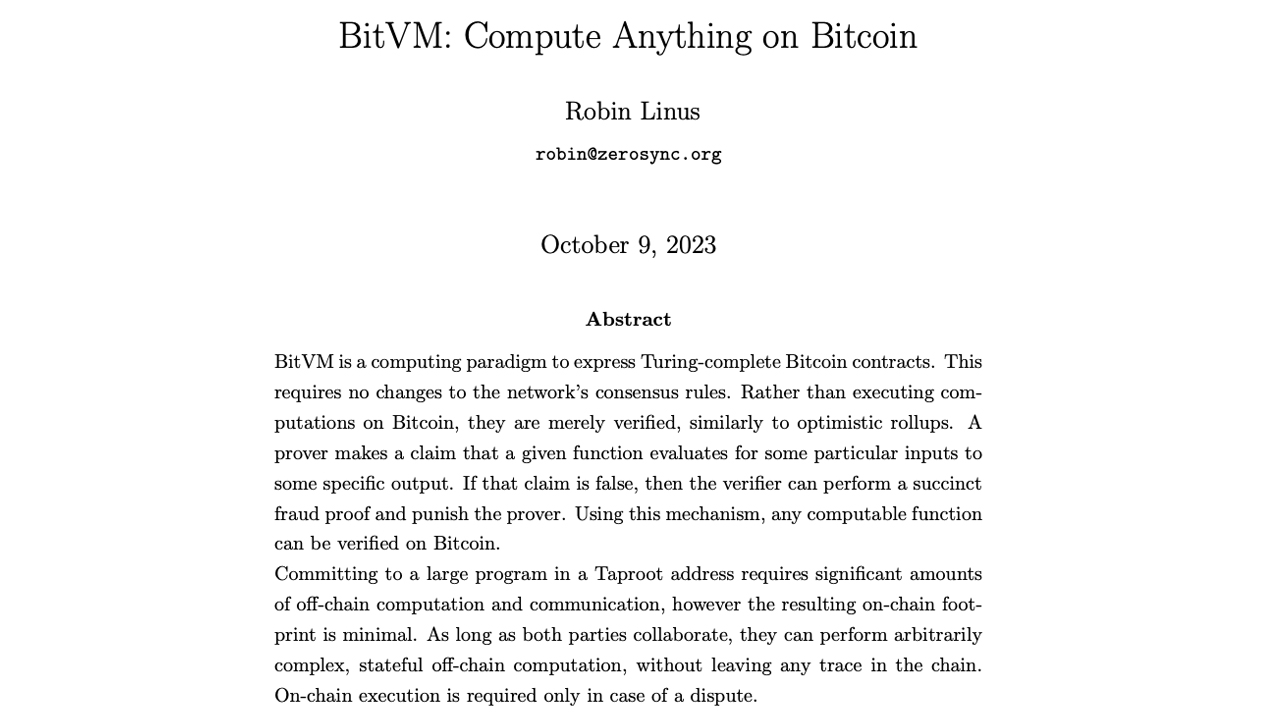
A new computing model, BitVM, aims to enhance Bitcoin’s smart contract capabilities without requiring changes to the blockchain’s consensus rules. The white paper, published on October 9, 2023, has drawn significant attention and its fair share of criticism.
Can BitVM Set a New Precedent for Bitcoin’s Smart Contracts?
BitVM was proposed in a recent white paper by blockchain programmer Robin Linus. It allows for the expression of Turing-complete Bitcoin contracts through fraud proofs and a challenge-response protocol between two parties. While some believe the model has limitations, others say it paves the way for more intricate Bitcoin transactions.
BitVM operates with a prover making a claim that a program runs correctly for specific inputs and outputs. The verifier can challenge that assertion with a series of succinct fraud proofs, penalizing the prover if their claim is untrue.

By encoding the program into a binary circuit and committing to it bit by bit in a Taproot address, both the prover and verifier can execute complex computations with a minimal onchain footprint. This permits any computable functions to be verified on Bitcoin, according to the white paper. However, BitVM is currently confined to a two-party setting between a prover and a verifier.
The paper points out drawbacks such as substantial off-chain computation for both parties. Yet it positions BitVM as a fresh approach to broaden Bitcoin’s capabilities without any protocol changes. This means there’s no need to modify the consensus rule set through a soft or hard fork.
Some developers have critiqued the model’s current utility. “Cool but effectively a generalization of a two-party game,” Blockstream CEO Adam Back wrote on the social media platform X (formerly Twitter). Lead Blockchair developer Nikita Zhavoronkov labeled it “Cool, but overhyped,” stating BitVM can’t “even multiply numbers efficiently.” The developer added:
Definitely not an ‘EVM on Bitcoin.’
Nevertheless, BitVM’s foundational framework hints at potential as a means to someday facilitate more elaborate smart contracts on Bitcoin. The two-party constraint implies functions like token swaps aren’t feasible yet.
Sam Parker commented on the social media platform X, noting that BitVM enhances capabilities without protocol changes, lessening ossification risks. Crypto analyst Sunny Decree wrote that a “new Bitcoin white paper enables all Altcoin utilities on Bitcoin” and emphasized “no soft fork required.”
“The thing that I am most excited about is being able to implement a ZK verifier in the BitVM,” said the CEO of Bioniq, Bob Bodily. “We still don’t know how, where, when, or if this will happen, but if you could implement a ZK verifier in the BitVM then you would unlock the full power of L2s directly on Bitcoin. Trustless bridging, more throughput, more privacy, cheaper transactions, unlimited programmability, more scale, etc. And all without a Bitcoin upgrade.”
The white paper describes BitVM as a “novel design space” for Bitcoin contracts and off-chain computation. As studies progress, its uses might broaden to fully highlight Bitcoin’s inherent computing prowess. In the short term, BitVM lets a prover and verifier execute Turing-complete programs with payments, validating outcomes through Bitcoin’s current fraud-proof system, thus widening smart contract prospects without changing the protocol.
In addition to the white paper, the project has been receiving donations to an address left at the bottom of the document. The donation address “bc1qf” has received 0.18555681 BTC worth just over $5K using current exchange rates.
What do you think about BitVM? Share your thoughts and opinions about this subject in the comments section below.
Comments
Post a Comment